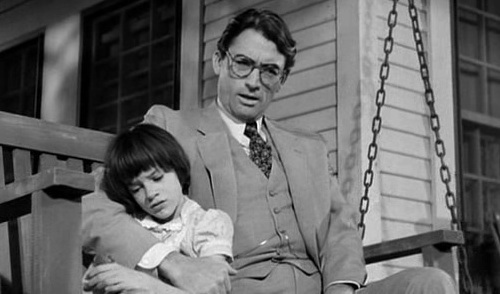
Gregory Peck, shown here in a screen shot with Mary Bad- ham, won a Best Actor Oscar as Atticus Finch, the great liber- al hero of Harper Lee’s To Kill a Mockingbird. But as it turns out, fiction’s most celebrated opponent of racial prejudice in the Depression-era Deep South was actually a fiction himself, a hero and role model only in his 6-year-old daughter’s eyes and mind: In reality he was a closet bigot and unapologetic racist. Finch’s true colors come out in Pulitzer Prize-winning novelist Harper Lee’s “sequel” that takes place 20 years fol- lowing the events depicted in Mockingbird as his now-grown- up daughter “Scout” is devastated to learn her father is not — and likely never was — the shining example of forward-thinking liberalism she mistakenly believed him to be when she was growing up, not unlike the author’s experience with her own father, upon whom the character Atticus is based.
EXCITEMENT, INTRIGUE, FEAR & CONTROVERSY
OVER HARPER LEE’S “NEW” NOVEL’S RELEASE
PROVES PRINTED BOOKS ARE FAR FROM DEAD
As Enoch Pratt gets long-awaited refurbishing,
what can we expect from libraries of the future?
ARE PUBLIC LIBRARIES JUDGING BOOKS
BASED ON POPULARITY, RATHER THAN
ON QUALITY, IMPORT & SIGNIFICANCE?
Entertainment centers? …or guardians of history?
By David Maril
While many soulless marketing trendsetters who want to use technology to drive our communica- tion skills back into the Stone Age consider printed books obsolete, hardcover publications have lately been in the news.
The excitement, controversy and fear over the publication of Harper Lee’s supposedly lost novel Go Set A Watchman has been interesting to follow.
Even though the book’s setting is years after the much-beloved To Kill A Mockingbird, it was actually written earlier.
While Harper Lee, the reclusive author, will never explain, the popular theory is that this newly published novel was the original draft of Mockingbird before her publisher demanded a series of rewrites, ultimately focusing on the rape trial of a falsely accused black man.
Atticus Finch, the driving moral force for justice and racial equality in Mockingbird, reveals, as a much older man, racist attitudes in the new book. This is quite unsettling to a generation of readers who considered him a hero.
Mockingbird was published in 1960; the film came out in 1962.
Some might argue the new book should be called “To Kill An Atticus.”
However, why not simply consider Watchman a separate entity from Mockingbird and critique it on its own? It’s fascinating to theorize why we are seeing a different Atticus.
The book’s focus differs from Mockingbird, concentrating on an older “Scout,” his daughter, returning to her small-town Southern home after having moved to New York.
Has Atticus changed or has Scout’s perception and understanding of her father and hometown changed?
Conversely, Mockingbird’s standing as a modern book classic should remain unchanged. The two books have threads of connection but do not deserve to be treated as if they are a two-part edition.
DEBATE OVER THE FUTURE DESIGN OF LIBRARIES
While intrigue builds as Mockingbird fans read and react to the new book, media coverage has been full of discussion and debate over the future design of libraries.
There’s growing focus on computer technology and online reference systems in contrast to people taking books out of the library or sitting around reading printed material.
Evaluations are being made to determine the proper proportion of space that should be dedicated to printed books in combination with technology.
In Baltimore, the main branch of the Enoch Pratt Free Library is being refurbished and reactions to the design and plans have been mixed. Some welcome the changes while others want to hold on to the traditional.
There are those who believe printed books will become obsolete. On an airplane or train, you probably see just as many people reading books on computer devices as in the form of hardcover or paperback editions.
I don’t know the answer to this. If vinyl records can come back, maybe there is hope for printed books.
There are still plenty of people who enjoy keeping what they read and savoring their shelves of book collections. However, I had an experience a few years ago at a swap shop on Cape Cod that started me wondering about the future of printed books and libraries.
At first glance, the selection of free books available at this particular popular swap shop, in Truro, Massachusetts, didn’t seem unusual.

Grand entrance to Baltimore’s landmark Enoch Pratt Free Library, on Cathedral St. downtown. The library was established in 1882 by a $1 million gift from Massachu- setts-born-and-raised local hardware merchant, banking and steamship company ex- ecutive, philanthropist Enoch Pratt. The building occupies three-quarters of a block.
There were the familiar copies of books that had never come close to any bestseller list, written by authors not much better known than names on a vanity press publication.
In the nonfiction section there was always at least one worn paperback edition of Kitty Kelley’s gossipy Frank Sinatra biography that makes America’s all-time greatest vocalist seem like the world’s biggest schmuck.
Some months, four or five copies appear, are grabbed up but eventually return. Most readers seem to lose patience quickly with the monotony of Kelley’s attacks.
There are usually enough Sidney Sheldon selections to support the theory he has produced mysteries faster than most people sign checks.
Steven King also falls into this category.
Every now and then you’ll find a classic book mixed in with the rubble of titles that had to be discounted — at 75 percent off — to originally sell.
A reward for one visit to the swap shop was a hardback edition of The Caine Mutiny. On other trips, several excellent David Halberstam books were discovered.
The swap shop regulars are generous with their books. There’s a feeling of sharing the wealth.
It’s common to see people walk in to leave a shopping bag full of books from home and then walk out with several selections from some of the shelves.
While many are trying to thin out their collections at home, they often end up leaving the store with as many as they had brought in.
At the end of the summer, or at any change of season, the selections dramatically increase as people are closing down homes and moving.
On this particular visit, much to my surprise, there was a copy of Mike Royko’s biography of former Chicago Mayor Richard Daley, entitled Boss. This was a book I had been looking to purchase for a number of years.
ONE OF THE BEST MODERN POLITICAL BIOGRAPHIES
Originally published in 1971 by the late great Chicago columnist, Boss is considered one of the best modern political biographies ever written. It’s an honest look at Daley, and chronicles corruption, greed and the power of political machines.
Boss has been out of print for over 25 years but used copies can be ordered on the Internet.
What really surprised me, however, was this particular book had a label inside, revealing it had formerly been the property of the Wellfleet Public Library.
It’s one thing for a person trying to clear space out of a home giving away books. But a library discarding this type of classic?
Jimmy Breslin, New York’s answer to Royko, once called Boss the best book ever written about a city in this country.
Out of curiosity, I called the Wellfleet Library to see if they had a copy of it.
Surely they had discarded this one because they had a newer one, in better shape.
A librarian put me on hold, probably needing a couple of minutes to figure out who Royko and Daley were.
“Sorry,” he said. “We don’t seem to have that book here. I could probably find a copy at another library in a day or two.”
BRANCH USED TO HAVE A COPY BUT GAVE IT AWAY
I informed him his branch used to have a copy but had given it away to a swap shop and I questioned why a library would not treasure such an important political biography.
“If it was up to me, we’d never get rid of any books,” he admitted.
“This sort of thing happens all the time. Some people here make a quick judgment looking at how many times the book is taken out. If it hasn’t been checked out much, there’s a chance someone here will decide it isn’t worth our keeping.
“Personally, I think that’s a poor way to run a library but that’s the way decisions are made. If something isn’t new and being checked out, it’s often gotten rid of.”
It’s pretty sad if libraries start being run like television networks, making decisions based on popularity rather than quality and relevance.
What’s in the future?
Can we look forward to library programs that focus only on books about reality television?
Are libraries entertainment centers or guardians of history?
davidmaril@voiceofbaltimore.org
“Inside Pitch” is a weekly opinion column written for Voice of Baltimore by David Maril.
CHECK OUT LAST WEEK’S “INSIDE PITCH” COLUMN: click here
…and read archived Dave Maril columns by clicking here.






July 26th, 2015 - 10:36 PM
[…] Voice of Baltimore by David Maril. CHECK OUT LAST WEEK’S “INSIDE PITCH” COLUMN: click here …and read archived Dave Maril columns by clicking here. […]